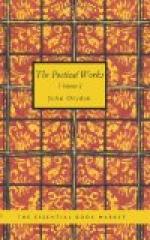but he has been pleased to descend to us; and what
Socrates said of him, what Plato writ, and the rest
of the heathen philosophers of several nations, is
all no more than the twilight of revelation, after
the sun of it was set in the race of Noah. That
there is something above us, some principle of motion,
our reason can apprehend, though it cannot discover
what it is by its own virtue. And, indeed, it
is very improbable, that we, who by the strength of
our faculties cannot enter into the knowledge of any
Being, not so much as of our own, should be able to
find out by them, that supreme nature, which we cannot
otherwise define than by saying it is infinite; as
if infinite were definable, or infinity a subject
for our narrow understanding. They who would
prove religion by reason, do but weaken the cause
which they endeavour to support: it is to take
away the pillars from our faith, and to prop it only
with a twig; it is to design a tower like that of
Babel, which, if it were possible, as it is not, to
reach heaven, would come to nothing by the confusion
of the workmen. For every man is building a several
way; impotently conceited of his own model and his
own materials: reason is always striving, and
always at a loss; and of necessity it must so come
to pass, while it is exercised about that which is
not its own proper object. Let us be content at
last to know God by his own methods; at least, so
much of him as he is pleased to reveal to us in the
sacred Scriptures: to apprehend them to be the
Word of God is all our reason has to do; for all beyond
it is the work of faith, which is the seal of Heaven
impressed upon our human understanding.
And now for what concerns the holy bishop Athanasius;
the preface of whose creed seems inconsistent with
my opinion; which is, that heathens may possibly be
saved. In the first place, I desire it may be
considered that it is the preface only, not the creed
itself, which, till I am better informed, is of too
hard a digestion for my charity. It is not that
I am ignorant how many several texts of Scripture seemingly
support that cause; but neither am I ignorant how
all those texts may receive a kinder and more mollified
interpretation. Every man who is read in Church
history, knows that belief was drawn up after a long
contestation with Arius, concerning the divinity of
our blessed Saviour, and his being one substance with
the Father; and that thus compiled, it was sent abroad
among the Christian Churches, as a kind of test, which
whosoever took was looked upon as an orthodox believer.
It is manifest from hence, that the heathen part of
the empire was not concerned in it; for its business
was not to distinguish betwixt Pagans and Christians,
but betwixt Heretics and true Believers. This,
well considered, takes off the heavy weight of censure,
which I would willingly avoid, from so venerable a
man; for if this proportion, “whosoever will
be saved,” be restrained only to those to whom
it was intended, and for whom it was composed, I mean




